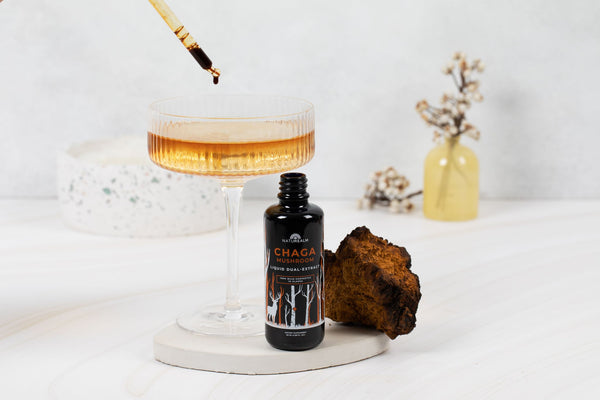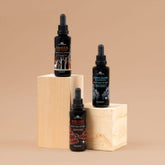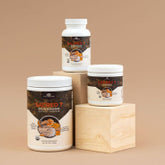
How to Pair Your Chaga Mushroom Tincture with Tea
The Chaga mushroom (Inonotus obliquus) is a powerful superfood used traditionally by several cultures as a medicine to treat and prevent diseases. Modern science has backed these claims, finding that Chaga has many beneficial qualities that can improve your overall wellness.
Chaga is a parasitic fungus primarily found on birch trees in colder climates. The mushroom has a very dark exterior that protrudes from the tree, while the interior has a distinct orange hue. The most effective way to ingest this fungus is through a tincture or powder to reap the full benefits of Chaga.
To make Chaga tea, you will need to process your Chaga to make it easier to integrate into your drink. If you cannot forage your own, you can purchase Chaga chunks online or from specialty stores to make your own supplements.
Chaga tincture recipe

If you want to make your own Chaga tincture, you should opt for a dual-extraction method. Dual extraction uses both hot water and alcohol to extract different beneficial compounds from the mushroom. Some of the compounds in Chaga are not water soluble, so alcohol helps infuse them into the tincture.
Break apart your Chaga into smaller pieces and grind them in a blender to ensure as much surface area of your Chaga is available for extraction.
Place the Chaga in a jar and fill it with just enough alcohol to cover it. For better results and to keep it shelf stable, you should use alcohol with a percentage of 25% to 35% (ex. vodka or grain alcohol). Keep the jar in a cool, dark place for at least a month, and give it a shake regularly.
After the month has passed, strain the alcohol put to the side. Reuse the ground Chaga, and add to a pot with twice the amount of water. Bring to a boil, then simmer on low for 2-3 hours.
Ensure the mushroom isn’t in boiling water for too long because too-high temperatures can damage the antioxidants. Keep an eye on the water content in the pot and add more as needed because it may gradually evaporate during this process.
Once the water extraction cools, strain the Chaga from the water solution. Combine the alcohol and water extractions into one container to complete your dual-extraction Chaga tincture.
How to make Chaga mushroom powder

Turning whole Chaga into a fine powder makes it easier to integrate into your beverages and recipes. Unfortunately, steeping in tea will not extract all the benefits, so you must consume the entire powder to absorb all the compounds. You will need to dry out the mushrooms on a low-temperature setting in your oven and blend them into a fine powder using a food processor or mortar.
You can use the ground Chaga powder in your teas or other recipes, but you will need to thoroughly blend it into your drink or strain with a cheesecloth or tea infuser so that you’re not left with a chunky, powdery beverage.
The best tea bags to pair with Chaga Mushroom Tincture

One of the best ways to consume mushroom extracts is in tea form because it’s tasty, cozy, and easy to make. Because of how long the prep time is to create your own tincture, we recommend adding two droppers full of Naturealm Chaga Tincture into any of these three teas for a great addition to your daily practices.
Rishi Organic Black Masala Chai
When you want that perfect warming pick me up, try our Chaga tincture with this perfectly balanced chai tea. The soothing aroma of cardamom, ginger, and star anise, combined with the subtle spice of the black peppercorns, makes this tea a great addition to your self-care routine. Steep some cinnamon sticks in for an extra kick, or turn this tea into a dairy-free latte by adding frothed coconut milk and a sweetener like maple syrup.
Bigelow Ginger, Peach, Turmeric Tea
Ginger, peach, and turmeric are arguably one of the best combinations of flavors in a herbal tea. You can cool it to turn it into a refreshing iced tea or drink it warm with a spoonful of honey for a sweet cozy treat. Chaga and turmeric contain potent properties that can fight inflammation, making them a great combo to integrate into your daily routine.
Pukka Elderberry and Echinacea Tea
If you’re feeling under the weather, or want to keep your immune system healthy, try adding Chaga tincture to this Elderberry and Echinacea herbal tea. All three ingredients are packed with antioxidants that protect cells from pathogens and infections. This tea is fruity, slightly tangy, and oh-so comforting.
Chaga Mushroom Tincture

Our Chaga Mushroom Tincture is sourced from wild-harvested Chaga from Alaska. It’s made using 100% mushroom fruiting bodies with a dual-extraction method, so you can take advantage of all the beneficial compounds Chaga has to offer.
The Health Benefits of Chaga Mushrooms
Antioxidant properties
Chaga is noted as one of the most powerful antioxidant substances because of a polysaccharide compound called beta-glucan, which promotes the production of antioxidant enzymes (1). It also contains polyphenol and triterpenoid antioxidants, which lower oxidative stress and free radical cell damage while boosting immune function.
Supports against inflammation
Along with inflammation-fighting polysaccharides, Chaga is rich in nitric oxide, which reduces cell inflammation. Additionally, Chaga can help regulate cytokine production, which strengthens cell communication and white blood cell production (2).
Anti-viral effects
The terpenoids in Chaga have excellent anti-microbial and anti-viral capabilities that have been studied as a potential treatment for SARS-Cov-2 and other viral illnesses (3). By interacting with the virus receptors, terpenoids prevent viruses from attaching themselves to a host cell.
When beginning your Chaga routine, keep in mind that it will take around two to three weeks until you notice the full effects. Take two droppers (360mg) of Chaga extract daily in tea or other beverages to boost your overall health.
References
-
Lu, Yangpeng, Yanan Jia, Zihan Xue, Nannan Li, Junyu Liu, and Haixia Chen. 2021. “Recent Developments in Inonotus Obliquus (Chaga Mushroom) Polysaccharides: Isolation, Structural Characteristics, Biological Activities and Application.” Polymers 13 (9): 1441. https://doi.org/10.3390/polym13091441.
-
Alhallaf, Weaam, and Lewis B. Perkins. 2022. “The Anti-Inflammatory Properties of Chaga Extracts Obtained by Different Extraction Methods against LPS-Induced RAW 264.7.” Molecules 27 (13): 4207. https://doi.org/10.3390/molecules27134207.
-
Basal, Wesam Taha, Abdo Elfiky, and Jehane Eid. 2021. “Chaga Medicinal Mushroom Inonotus Obliquus (Agaricomycetes) Terpenoids May Interfere with SARS-CoV-2 Spike Protein Recognition of the Host Cell: A Molecular Docking Study.” International Journal of Medicinal Mushrooms 23 (3): 1–14. https://doi.org/10.1615/intjmedmushrooms.2021037942.


